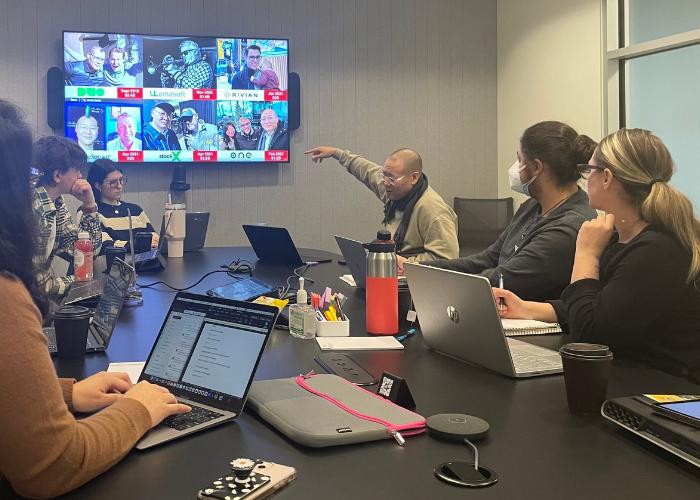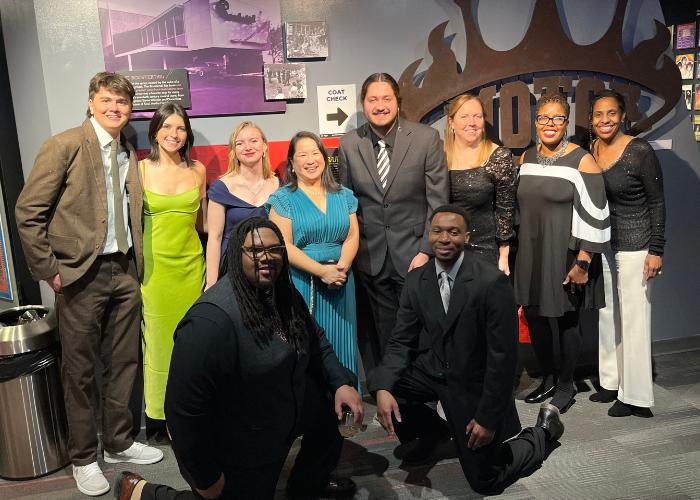Anthropology course offers deep dive into Detroit's Black tech ecosystem
In the heart of Detroit, an innovative Wayne State University anthropology class is taking students beyond the classroom and into the vibrant world of Black tech entrepreneurship. Professor Yuson Jung's The Emergence and Development of Black Tech Entrepreneurship Ecosystem in Detroit isn't your typical practicum course. Here, "students aren't just learning," said Jung, "they're living it."

Think Silicon Valley, but infused with Detroit's unique spirit, history and drive for social justice. This is about more than entrepreneurship — it's about community, empowerment and shaping a more equitable future.
The ultimate goal is to understand the ecosystem's strengths and challenges. At the end of the course, students will present their findings to Milestone Growth Capital Institute (MGCI), a Detroit non-profit led by WSU alumna Dr. Dawn Batts. Ultimately, their research will provide MGCI with actionable recommendations to nurture a thriving tech landscape that benefits everyone in Detroit.
This kind of experiential learning is a key component to WSU’s College to Career initiative which seeks to provide every student with learning opportunities that allow them to encounter the world, gain deeper insights and new perspectives, and prepare for prosperous careers.
Through interviews, observations and participation in events like Black Tech Saturdays, students are gaining firsthand insights into the ecosystem's pulse.
Total immersion
The students have had the benefit of connecting with key stakeholders of Detroit’s tech ecosystem during class. “We have had guest speakers such as Johnnie Turnage, co-founder of Black Tech Saturdays; Dug Song, co-founder of Duo Security, Michigan’s first unicorn tech company and chairman of the Song Foundation,” said Jung.

The class also attended the Hustle Gala at the Detroit Historical Museum, immersing themselves in the city's rich history of Black entrepreneurship and business. The event provided valuable networking opportunities with community members and deepened their understanding of the city's business landscape.
Student Kayleigh Reimueller says the unique format of the practicum has been the Detroit primer she didn’t know she needed. “As a newcomer to Detroit, I have learned so much about the city’s history through talking to lifelong Detroiters and stakeholders within this community.” She added: As someone who sometimes struggles to learn in a lecture-based classroom, Dr. Jung has allowed me to apply my knowledge and strengths in a way that reflects what I hope to do as a career once I have finished graduate school.”
Bridging the past and present
While this course looks to the future of entrepreneurship, Detroit's rich history isn't forgotten. By drawing on the work of Wayne State professors Krysta Ryzewski and Felicia George, students connect the dots between Motown's music powerhouses and today's tech disruptors. “We are fortunate to have researchers in our own department who remind us about Detroit’s deep business history and economic/commercial networks,” said Jung. “Students are eager to connect these rich histories with the emerging tech ecosystem and its development.”
Business anthropology: Putting culture at the forefront
This unique practicum is an intensive hands-on immersion in doing business anthropology. Utilizing ethnographic research and cultural insights, these future anthropologists contribute to real-world challenges, not just in Detroit, but across an array of industries.
As cultural experts, practitioners in this field typically contribute as qualitative researchers in User Experience (UX), consumer insights and strategy research using ethnographic research skills and perspectives. Business anthropologists can go on to work in diverse organizational settings including companies, non-profits, hospitals and government.
The course's unique value extends beyond its immersive approach. Wayne State's location grants students unparalleled access to Detroit's vibrant business landscape, putting them in the same room with entrepreneurs and leaders. This "non-extractive knowledge production," as Jung emphasizes, ensures their research directly benefits the community they study. "This method really motivates our students who love the city and feel energized by the prospect of giving back to our urban community with their work."
To learn more about the work of Wayne State's anthropology department, visit anthropology.wayne.edu.